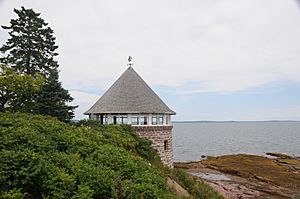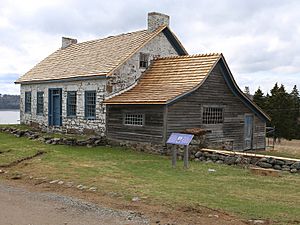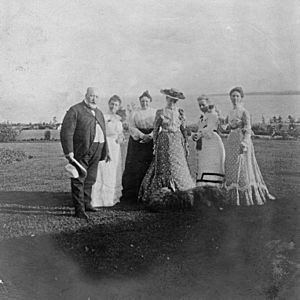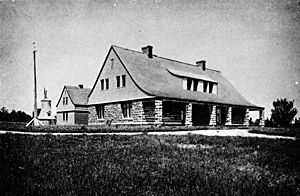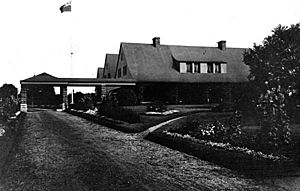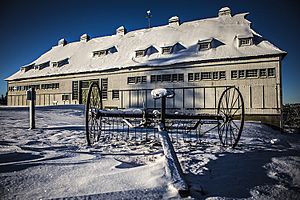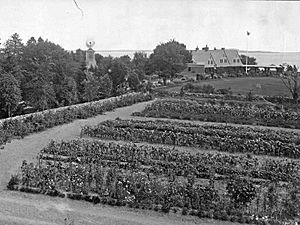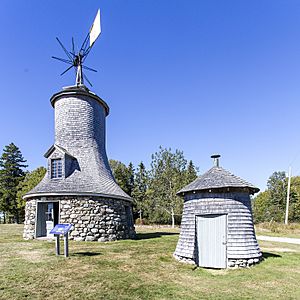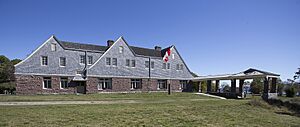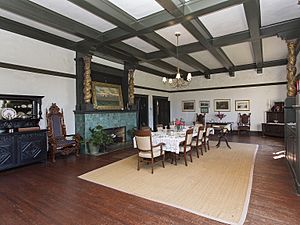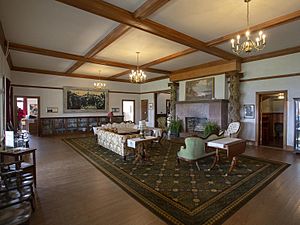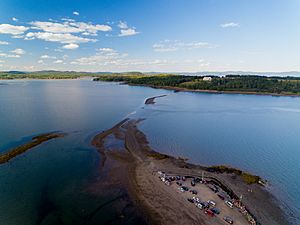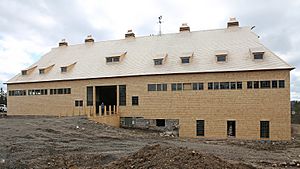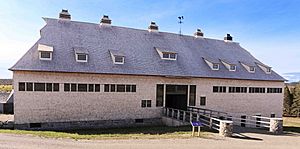Ministers Island facts for kids
Ministers Island is a special island in New Brunswick, Canada. It's located in Passamaquoddy Bay, close to the town of St. Andrews. What makes this island unique is that you can drive to it! At low tide, a wide gravel bar appears, connecting the island to the mainland.
In the late 1800s, Ministers Island became famous. It was the summer home of Sir William Van Horne, who was the president of the Canadian Pacific Railway. By the time he passed away in 1915, the island had become like a dream place. It had a huge sandstone mansion, beautiful gardens, and even a farm with special animals. It was one of the most amazing summer homes in St. Andrews.
Contents
Island History: Early Days
Ministers Island was known as Consquamcook or Quanoscumcook Island long ago. The Passamaquoddy people lived there for centuries. We know this because of the shell middens they left behind. These are piles of shells and other things from their daily lives. Today, these shell middens are a National Historic Site. A special stone marker, called a cairn, remembers this important history.
First European Settlers
The first European settlers arrived on the island in 1777. They were John Hanson and Ephraim Young. They were Loyalists, people who supported Britain during the American Revolutionary War. They settled on the island with their families. Later, in 1791, the island was sold to the local minister, Reverend Samuel Andrews. The island was later named after him.
Reverend Andrews built a small stone cottage on the island. This cottage is still standing today! The island stayed in his family for many years. Finally, in 1891, it was sold to Sir William Van Horne.
Van Horne's Dream Home: Covenhoven
In 1889, Sir William Van Horne, the president of the Canadian Pacific Railway, visited St. Andrews. He loved the area. In 1891, he bought 150 acres (about 0.6 square kilometers) of Ministers Island. He then started building his amazing summer home, which he called Covenhoven.
Van Horne designed Covenhoven himself. It was built using red sandstone from the island. He kept adding to the house between 1892 and 1901. The house grew to have 10,000 square feet of space! He got help from Edward Maxwell, a famous architect from Montreal. Maxwell designed many important buildings, including parts of the Château Frontenac. When it was finished, Covenhoven had 50 rooms!
Van Horne loved collecting old and beautiful things. The walls of Covenhoven were covered with about 80 pieces of art. Many of these paintings were done by Van Horne himself! He often painted birch trees and landscapes from the island. You can still see 21 of his paintings in the house today. Covenhoven and its gardens became very famous. Tourists and important guests would visit the island just to see it.
The Great Barn
In 1898, Edward Maxwell designed a huge barn for Van Horne. It was one of the biggest and most beautiful barns in the Maritimes region. This barn was used to breed special animals. Van Horne had prize-winning Clydesdale horses and Dutch Belted cattle. His farm also had pigs, geese, ducks, chickens, and turkeys. Fresh food from the farm and gardens was even sent to his family in Montreal during the winter!
Beautiful Gardens
Next to Covenhoven were several large greenhouses. These greenhouses grew fruits like grapes, peaches, nectarines, cherries, and even cucumbers for the family. Van Horne was an expert gardener. His grounds were famous for their many flower beds and fruit orchards. Miles of well-kept roads wound around the island. These paths were perfect for walking, riding horses, or taking carriage rides.
Other Buildings
Besides the barn and greenhouses, Covenhoven had many other important buildings. These included a windmill, a gas house, a carriage house, and a gardener's cottage. At the very end of the island, Van Horne built a unique bathhouse. This building was perfectly round and had two levels. The top level offered amazing views of the bay. The bottom level had changing rooms and led to the beach and the family's special tidal swimming pool.
Ministers Island After Van Horne
After Sir William Van Horne passed away in 1915, his daughter Adaline inherited the estate. She loved the island and took care of it until she died in 1941. Over the years, the property was managed by different people in the family. However, keeping up with the large estate was very expensive. The gardens and greenhouses were made smaller.
In 1961, the island was sold to an American company. They wanted to turn it into a private resort with Covenhoven as a clubhouse. They even planned a golf course and an airstrip! But these plans didn't work out because the island was too expensive to operate and hard to reach.
The island was sold again to a real estate developer named Norman Langdon. His plans were similar, and they also faced the same problems. In 1977, Langdon decided to sell everything at an auction. This included the contents of the house and the island itself. Many people thought Covenhoven was very important to Canada's history because of Van Horne's connection to the country's growth.
The Province of New Brunswick bought the island in 1977. They wanted to protect this important historical site.
Ministers Island: A National Historic Site
The island's Shell Midden was recognized as a National Historic Site in 1978. This showed how important the site was to First Nations history. Then, in 1996, the entire island was declared a National Historic Site because of its strong connection to Sir William Van Horne. For many years, the island was mostly closed to visitors.
Protecting Ministers Island Today
In 2004, a non-profit group called Van Horne Estate on Ministers Island Inc. was created. Their goal is to "protect, preserve, develop and promote the legacy of Ministers Island." They started managing the island in 2006. This group now offers tours during the summer and works on restoring the buildings. Between 2012 and 2017, the number of visitors to the island grew a lot! This shows that more and more people recognize how important this place is.
Restoration Work
Many of Van Horne's original items were taken from the house during the 1977 auction. But thanks to recent efforts, many of these items have been returned! Original paintings and furniture have been fixed up. Other items from that time are now displayed throughout the house.
Restoration work is always happening at Covenhoven. Rooms are being fixed up and opened to visitors all the time. The stone bathhouse and the windmill-pump house were restored in 2008.
After a big storm in 2016, the Great Barn needed a lot of work. It is currently being restored with funding from the Province of New Brunswick and the Government of Canada. Future plans for the island might include places for people to stay overnight, new facilities for large groups, and food services. These plans could create many jobs and bring in more money for the area.
Images for kids
 | Selma Burke |
 | Pauline Powell Burns |
 | Frederick J. Brown |
 | Robert Blackburn |


